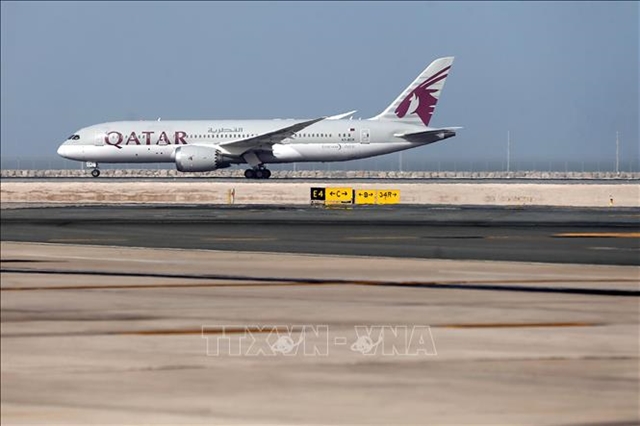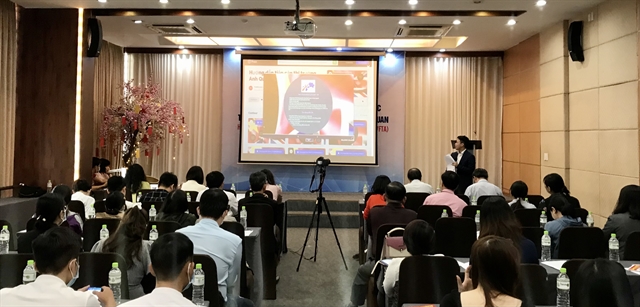 Economy
Economy


|
| Speakers at the seminar on how to boost exports to the UK under the UK-Việt Nam Free Trade Agreement yesterday in HCM City. VNS Photo Bồ Xuân Hiệp |
HCM CITY — Vietnamese firms must improve product quality, strictly follow the rules of origin and ensure food safety to export goods to the UK under the recently signed UK-Việt Nam Free Trade Agreement, speakers said at a seminar on Thursday in HCM City.
Phạm Bình An, director of the HCM City International Integration Support Centre, said that under the UKVFTA, Việt Nam would greatly benefit when exporting to the UK due to commitments to market opening and quotas for some of the country’s most competitive exports like agricultural and fisheries products.
Amid the COVID-19 outbreak, the UK’s demand for agricultural products, food, electronic products, personal protective equipment, and laboratory equipment has been increasing, and the trade deal will offer Việt Nam the opportunity to export such products.
The UK market, however, is highly demanding about standards and quality requirements on imported products, forcing Việt Nam to improve product quality and ensure consistency of products to conquer the choosy market.
The trade deal will also cause competitive pressure on the domestic economy, especially in sectors and industries in which the UK has strength such as financial services, pharmaceuticals and chemical industries.
Vũ Việt Thành, chief of the Europe and North America Market Deparment under the Ministry of Industry and Trade, said that Việt Nam exports phones and components, garments, footwear, fishery, wood and wooden products, computers and parts, cashews, coffee and pepper to the UK. It imports machinery, equipment, pharmaceuticals, steel and chemicals from the UK.
Trịnh Thị Thu Hiền, head of the Product Origin of the Import Expert Department under the Ministry of Industry and Trade, urged Vietnamese exporters to enhance competitiveness of products, improve production and business capacity, and apply science-technology to increase value of their products.
They must also enhance supervision over the use of antibiotics in processing, and ensure food safety to meet requirements of the importers.
In addition, Việt Nam must adhere to the Rules of Origin (RO) when exporting to the UK, especially because traceability regulations in the country have become increasingly strict.
Recently, the first 60 tonnes of jasmine rice were shipped to the UK under the UKVFTA.
Nguyễn Sơn Trà, head of the WTO and trade negotiation division at the Ministry of Industry and Trade’s multilateral trade policy department, said the trade pact took effect on December 31, 2020.
It was negotiated based on commitments made under the EU-Việt Nam Free Trade Agreement (EVFTA) with necessary adjustments to ensure it conforms with the Việt Nam-UK bilateral trade framework.
Under the UKVFTA, the UK has eliminated 65 per cent of tariffs and will increase it to 99 per cent within seven years. Việt Nam has removed 48.5 per cent of tariffs, and this will rise to 92 or 98 per cent after six years.
As the trade deal inherits the EUVFTA, it is set to create a comprehensive, long-term and stable economic and trade co-operation framework between the two countries, according to Trà.
The UK is the third largest trade partner of Việt Nam in Europe.
According to the Vietnamese General Department of Customs, bilateral trade reached $6.6 billion in 2019, in which Việt Nam’s exports to the UK accounted for nearly 88 per cent.
The two countries saw an average annual growth of 12.1 per cent in import-export revenue during the 2011-19 period, higher than Việt Nam’s average level of 10 per cent. — VNS




